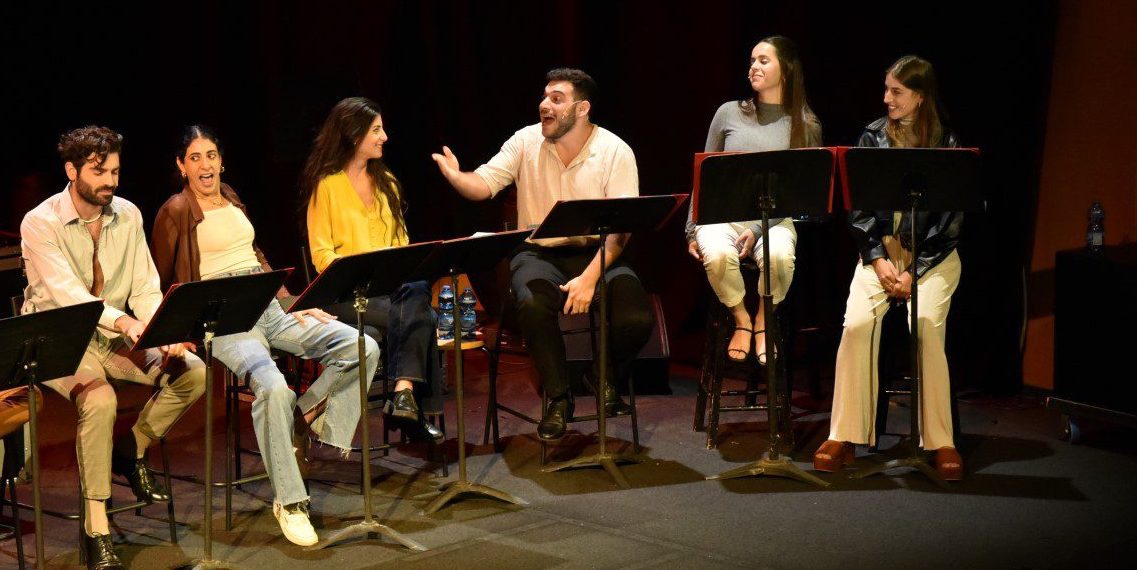Not an opera. Not a play. Not a concert. These declarations are highlighted on Michael Temporary Name’s website. So what it is? Gon Halevi calls it a modern comic tragedy. Halevi, who studied opera at Mannes College of Music in New York, wrote and composed a musical dramatic narrative for eleven singers and a grand piano. And it is a thing of beauty.
The players, both men, and women sit on stools arranged in a semicircle. According to Halevi, these are the “chorus women who weave the plot”. The idea reminded me of the semicircle of sawing women in Pedro Almodovar’s film The Flower of My Secret. Halevi himself sits by the grand piano to the left of them. As he explains in the beginning, he also sings the part of Dor, the lead character.
Through a gorgeous choral piece, we learn that Dor (Itamar Elbaz) and Noa (Hagar Paz), who sit in the middle, are a young couple expecting a baby. The rest of the singers who participate in the chorus sometimes become characters – Noa’s best friend (Sharon Ben Dror), Dor’s parents (Gal Hazaz and Assaf Levi), the obstetrician who will deliver the baby (Gal Zak), a lawyer, a coffee shop waitress, and a confectionery shopkeeper who will turn out to have a major part in the drama.
The first half of the performance portrays the life of an average urban family, complete with a nagging, but really nice, mother-in-law. The biggest drama is around the choice of name for the soon-to-be-born baby. This portrait of life in Tel Aviv is lifted from the mundane by the celestial beauty of the perfect harmonies. Halevi is an exceptional singer – he wrote some of the best songs for himself – as are all the other players. The choral music is sometimes reminiscent of modern American operas, yet each song in itself is melodic and unique. The grand piano successfully fills in for a full orchestra, and as the music flows into the spoken dialogue, the lack of movement on the stage is hardly felt.
When the baby is born, after a painful delivery, we expect to see how the happy couple deals with the new challenge. But then the doctor tells them Michael had died due to some rare syndrome. It is only after the burial that the family starts to suspect foul play. A report on TV and a chance meeting with another mother who lost her baby brings the family to believe that their baby was abducted in order to be sold for adoption. But the police is unwilling to investigate, lawyers refuse to take the case, the obstetrician is scared to speak, and it seems there is a wide conspiracy run by very powerful and dangerous people.
To understand this strange turn of events, one must be aware of what is known as The Yemenite Children Affair, which is currently a very hot topic in Israel. It refers to the disappearance of babies born to Middle Eastern immigrants who “made Aliyah” to the newly founded state of Israel. Hundreds of documented statements made over the years by parents allege that between 1948 and 1954 their children were taken from them without sufficient explanation. There have been allegations that no death certificates were issued, and that parents did not receive any information as to what had happened to their babies.
These claims are finally being investigated, so far without conclusive results. Widespread accusations continue that the infants were given or sold to childless Holocaust survivors in a covert systematic operation, but three separate official commissions unanimously found that the majority of the children were buried, having died from diseases.
Was there a horrific crime of abduction, or just a sin of enormous insensitivity by the medical establishment? What is not in doubt is that one way or the other, the immigrants were treated with blatant prejudice, and for many years their claims were ignored. It seems that this is what Halevi is trying to do with his theatrical piece. In telling a similar story today, about Ashkenazi parents from Tel Aviv, he is aiming to open the eyes of people who resist the abduction theory. By taking the racist element out of the story, he seems to be trying to shed a light on the unconscious racism that still motivates the thinking of some people.
The problem is that you can’t take the social context of the history of institutional racism out of the affair, because without it the story loses its authenticity and its political edge. As told, it is just a farfetched horror story, which is not supported by the bare theatrical production. The final result is a flawed stage piece, with superb music that deserved a better drama.

